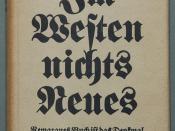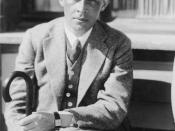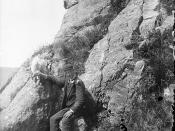Throughout the text, All Quiet on the Western Front, the author, Erich Remarque, makesreference to the soldiers at war losing all sense of humanity. This is proven when the main character Paul, a nineteen year old soldier, is sent to war and turns into a ÃÂhuman animal.ÃÂ (Remarque, 1929, p40). Another example of the dehumanization of the soldiers is when Paul returns home on leave, and finds himself unable to connect with his family. Furthermore, PaulÃÂs death in the final paragraph of the book illustrates to the reader how inhumane war is, and how inhumane the soldiers at war have become.
Through the duration of the text, Remarque makes mention of the fact that the soldiers are losing their humanity and on several occasions, ÃÂturning into human animals.ÃÂ (Remarque, 1929, p40). Remarque constantly refers to this metaphor, as if to remind the reader of the consequences of war.
The constant killing of humans on the opposite side, with no sense of remorse, demonstrates to the reader that the soldiers have lost all emotion they may have had before the war begun. An example of this can be found when Paul stabs a French soldier who jumped into his shell hole. Paul explains that he, ÃÂjust stabs wildly and feels only how the body jerks,ÃÂ suggesting that this behavior is not how a human being should act, rather, how an animal would act. In the beginning of the text, Remarque hints to the reader that the characters involved within the book are beginning to evolve and lose their own sense of emotion. Paul says ÃÂWe have lost all our ability to see things in other ways.ÃÂ (Remarque, 1929, p15). This indicates that the human face is now slowly being stripped from the soldiers fighting at war.
The author uses the section of the book where Paul returns home as another method of showing how the human face is stripped from the casualties at war. When Paul returns home after being granted leave, he finds himself unable to connect with his family at home. This is then used to show how the human emotion, that would normally be felt, has been lost though the fighting at war. This is shown when Paul does not want to talk to his mother on the last night, even though it may be the last chance he will ever get. Paul tells the reader that ÃÂit would be just too hard to talk, to be awake together.ÃÂ(Remarque, 1929, p130) This gives the reader a better understanding of the type of person that Paul has become. Paul now has so little emotion within himself, that he does what no other human would do. He decides not to talk to her even though she is dying physically and he is dying emotionally. In the final sentence of the section with Paul and his mother, the author decides to portray the thoughts within PaulÃÂs head. ÃÂI should never have come home on leave.ÃÂ (Remarque, 1929, p132). From this one sentence, the reader now has no other option than to believe that all humanity has been wiped from the soldiers at war.
Finally, the way that the author chooses to portray PaulÃÂs death at the end of the text, also shows how the characters at war have turned into animals. Remarque uses only one short paragraph to tell the reader about the death of Paul. ÃÂHis face wore an expression that was so composed that it looked as if he were almost happy that it had turned out that way.ÃÂ (Remarque, 1929, p207). Here the author shows how the sense of humanity has returned as Paul leaves the front line. Although he is now dead, the reader gets the impression that Paul was happy to leave the war and his animal like behavior and emotion. This also shows that Paul has now regained his human face and emotion, as he will now be with his old school friends.
In conclusion, Remarque uses various scenes and sections of the text to portray consequences that come from fighting within the war. The author mainly focuses on the characters becoming dehumanized as the war progresses. He uses death, emotional feelings and thoughts of one of the main characters to help with the portrayal of the consequences. The final paragraph is the only time when Paul, the narrator, is used but instead the text is given to us in third person. This is used to successfully show that, although the main character did everything mentioned in the text, the consequences for him were no different to any other soldier on the front line.
Bibliography:All Quiet on the Western Front, Erich Remarque, 1929





![[Portrait of Les Paul, Fat Tuesday, New York, N.Y., ca. 1980s] (LOC)](https://s.writework.com/uploads/3/31608/portrait-les-paul-fat-tuesday-new-york-n-y-ca-1980s-loc-thumb.jpg)